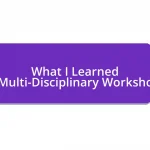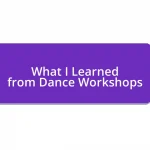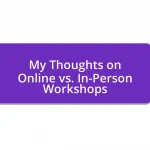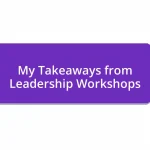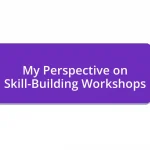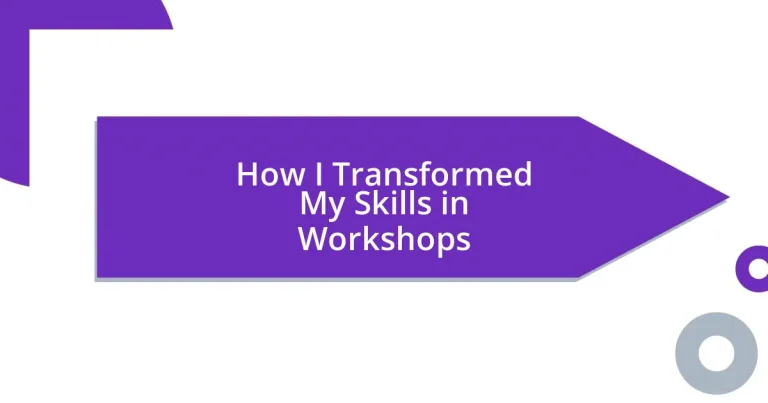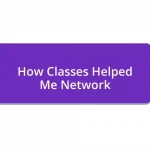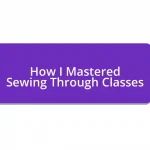Key takeaways:
- Embracing discomfort as a novice is crucial for skill transformation and personal growth.
- Workshops foster hands-on learning, networking opportunities, and immediate feedback, enhancing both skills and community building.
- Choosing the right workshops aligned with personal goals and researching facilitators can significantly elevate the learning experience.
- Reflecting on workshop experiences and applying learned skills in real-world contexts fosters deeper connections and enhances teamwork dynamics.
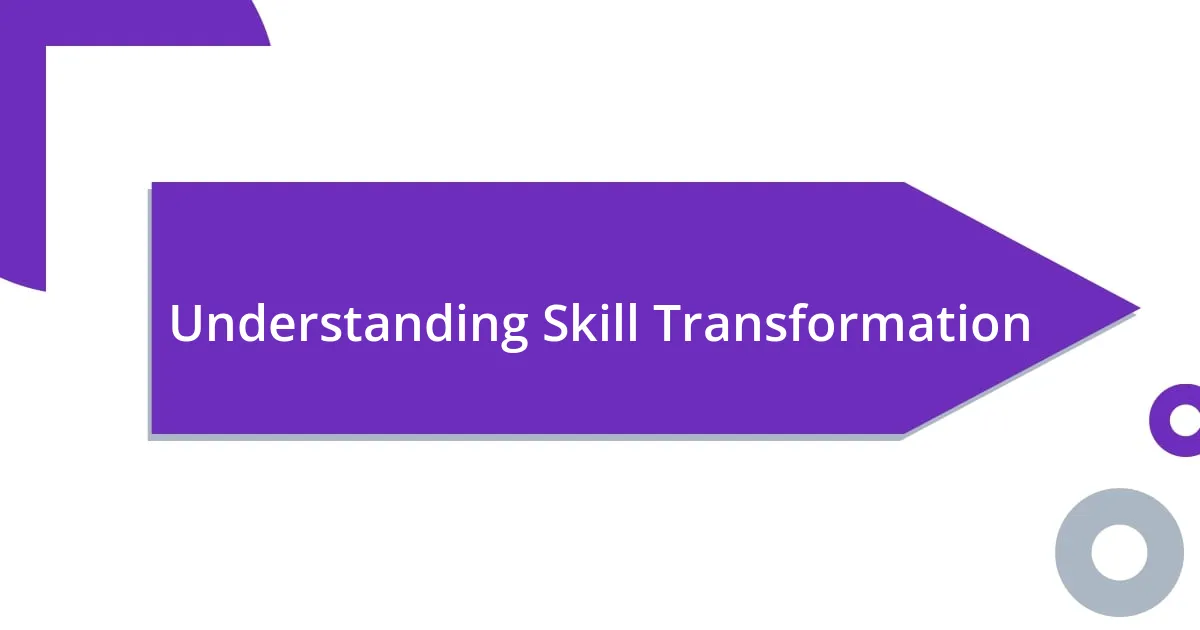
Understanding Skill Transformation
Skill transformation is a profound journey. I remember standing in my first workshop, feeling overwhelmed yet excited. For me, the real change happened when I embraced the discomfort of being a novice. Have you ever felt that mix of anxiety and anticipation? That’s where growth begins.
As I navigated various workshops, I discovered that transformation often requires a willingness to step outside one’s comfort zone. Each session was an opportunity to tackle what I feared the most—public speaking, for instance. I can still recall the flutter in my stomach as I shared my first ideas aloud. Isn’t it fascinating how facing our fears can ignite a dramatic shift in our confidence?
There’s also the beauty of collective learning. In one workshop, I connected with peers who shared diverse experiences. Their insights were invaluable and often challenged my thinking. Have you experienced that pivotal moment when someone’s perspective reshapes your own? Engaging with others not only enhances our skills but also deepens our understanding of ourselves.
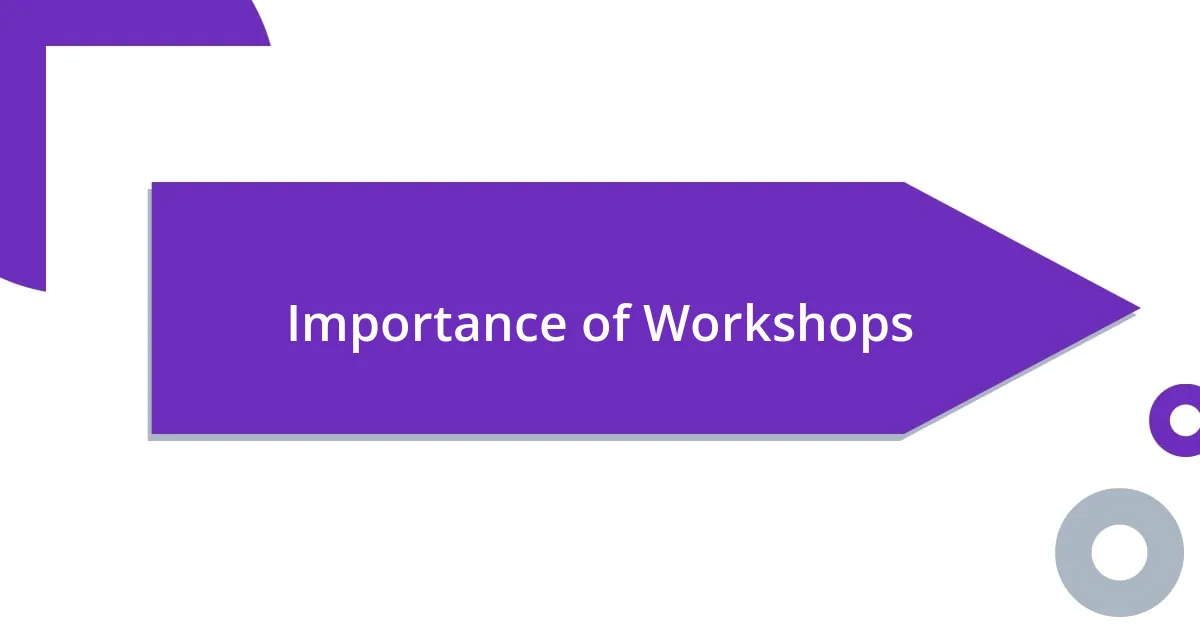
Importance of Workshops
Workshops play a crucial role in personal and professional development. They create an environment brimming with shared knowledge and experiences. I remember the thrill of gaining fresh perspectives and techniques during a particularly intensive session on creative problem-solving. The energy in the room was palpable, and it dawned on me how collaborating with others fosters not just learning but a sense of community.
Here are some key reasons why workshops are so important:
- Hands-on Learning: Engaging directly with materials and methods enhances retention.
- Networking Opportunities: Meeting like-minded individuals can open doors to new collaborations and friendships.
- Immediate Feedback: Receiving constructive criticism right away allows for quick adjustments and improvements.
- Expert Guidance: Accessing the expertise of instructors gives insight that self-study often lacks.
Participating in workshops also ignites a sense of accountability. I felt an unspoken commitment to not only myself but to my peers as well, which pushed me to fully immerse myself in the learning experience. There was a moment during a workshop where I had to present a project idea in front of the group. Butterflies danced in my stomach, but the encouragement I received from fellow participants made me realize that we’re all in this together, making mistakes and learning side by side. That camaraderie is something I cherish; it’s a reminder of our shared journey toward growth.
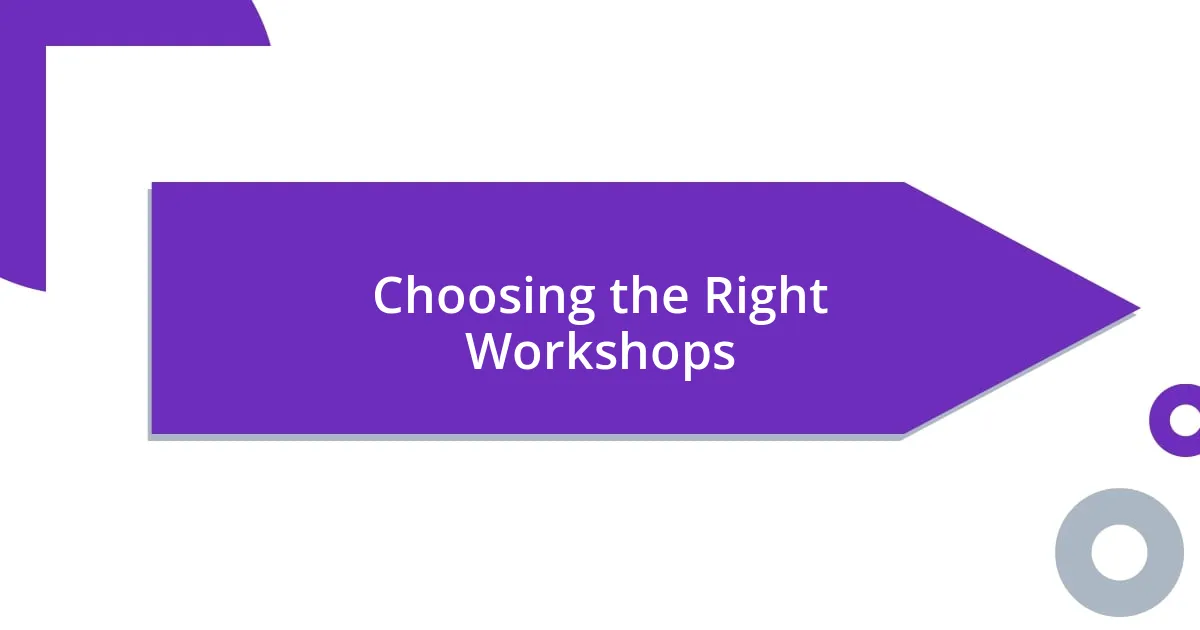
Choosing the Right Workshops
Choosing the right workshops can feel like navigating a maze, especially with so many options available. I remember scrolling through endless choices, feeling both excited and overwhelmed. What helped me was identifying my specific goals. Were I looking to enhance my leadership skills or perhaps dive into digital marketing? Reflecting on my objectives allowed me to filter through the clutter and choose workshops that aligned with my aspirations.
As I evaluated potential workshops, I learned the importance of researching the facilitators. I can’t stress enough how vital it is to consider their background and experience. In one instance, I chose a workshop led by a seasoned entrepreneur who had successfully launched multiple startups. The insights I gained from her first-hand stories were invaluable. Do you ever wonder how impactful learning can be when you’re studying under someone with real-world experience?
Lastly, I discovered the value of peer reviews and testimonials. Before enrolling in a workshop, I now look for feedback from previous participants. These voices often provide the clarity I need. I once hesitated to join a creative writing workshop until I read glowing reviews about the supportive community. That turned out to be a pivotal decision in my writing journey. Isn’t it remarkable how the experiences of others can directly influence our choices?
| Workshop Aspect | Importance |
|---|---|
| Goals | Aligning workshops with personal objectives ensures focused learning. |
| Facilitators | Choosing experienced facilitators enhances the learning experience. |
| Peer Reviews | Previous participant feedback offers valuable insight before deciding. |
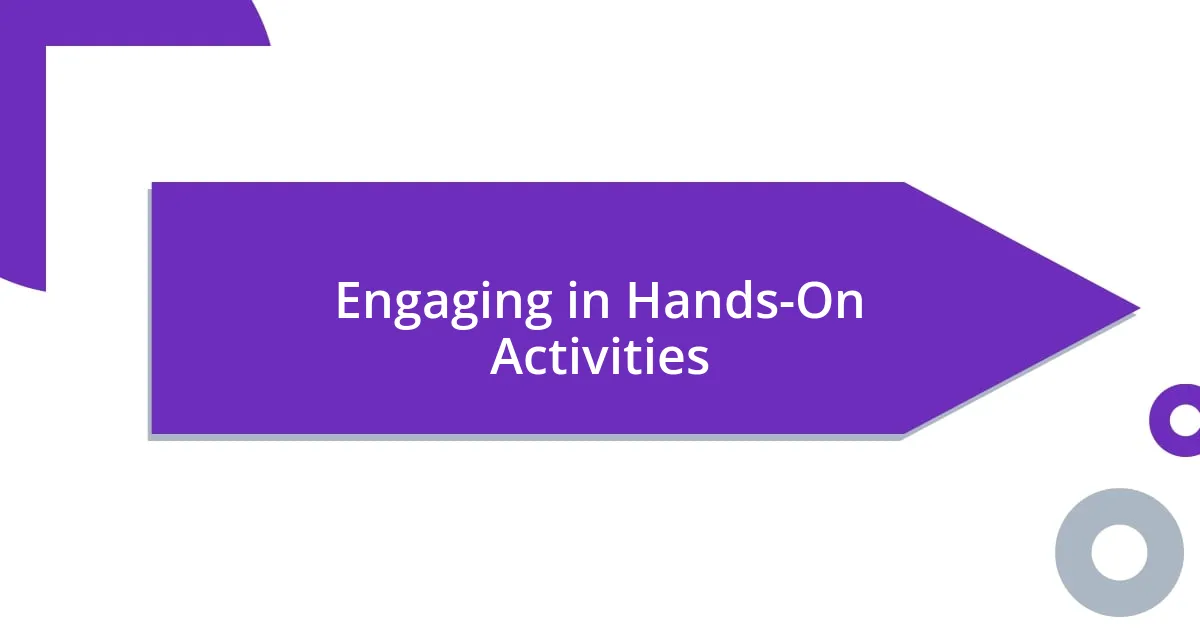
Engaging in Hands-On Activities
Engaging in hands-on activities has been a game-changer for me. I vividly remember a workshop where we not only discussed photography techniques but actually took our cameras outside to shoot. The difference in my understanding was astounding. It’s one thing to read about composition and lighting, but another entirely to adjust settings on the fly and capture that perfect shot while being critiqued in real-time.
I also learned the importance of embracing failures during these hands-on sessions. There was a moment when my project plan completely fell apart in front of my peers. Rather than feeling defeated, I used that experience as a stepping stone for improvement. The sense of freedom in making mistakes and learning directly from them is something I cherished. Hasn’t everyone felt that moment where they learn the most from a failure?
The joy of collaboration during hands-on activities can’t be underestimated. In one workshop, our team had to build a prototype for a product idea. We brainstormed, divided tasks, and came together to create something tangible. The excitement of seeing our idea materialize before our eyes cemented my belief that real learning occurs when we actively engage and collaborate. Aren’t those moments when collaboration transforms ideas into reality the ones we remember most vividly?
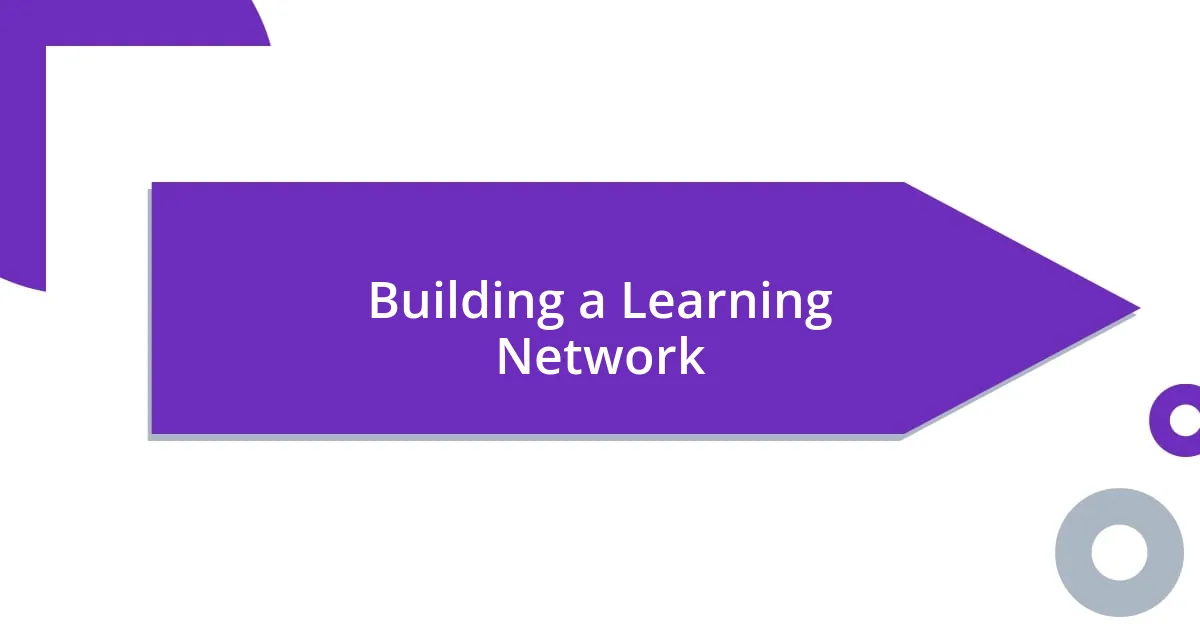
Building a Learning Network
Building a learning network has been one of the most rewarding aspects of my workshop experiences. I recall the first time I connected with fellow participants during a group project. We shared not just ideas but our personal stories, which added depth to our collaboration. It struck me how forming these bonds transformed a simple workshop into a supportive community that motivates each member to grow. Have you ever felt the energy that comes from shared intentions and collective support?
As I dove deeper into networking, I realized that attending social events or informal meetups related to workshops significantly expanded my circle. I found that engaging in conversations over coffee with like-minded individuals often sparked inspiration that formal sessions alone couldn’t. One evening, I met someone who had a similar passion for sustainable design; that connection turned into a mentorship that shaped my understanding of the field. Isn’t it incredible how a casual chat can lead to profound professional relationships?
Moreover, I started leveraging online platforms to keep the connections alive post-workshop. I remember creating a WhatsApp group with participants from a recent digital marketing workshop, allowing us to share resources and insights long after the event ended. This ongoing dialogue enriched my learning journey and provided continual support as we navigated the challenges of implementing new skills. How many opportunities slip by if we don’t take that extra step to maintain our connections?
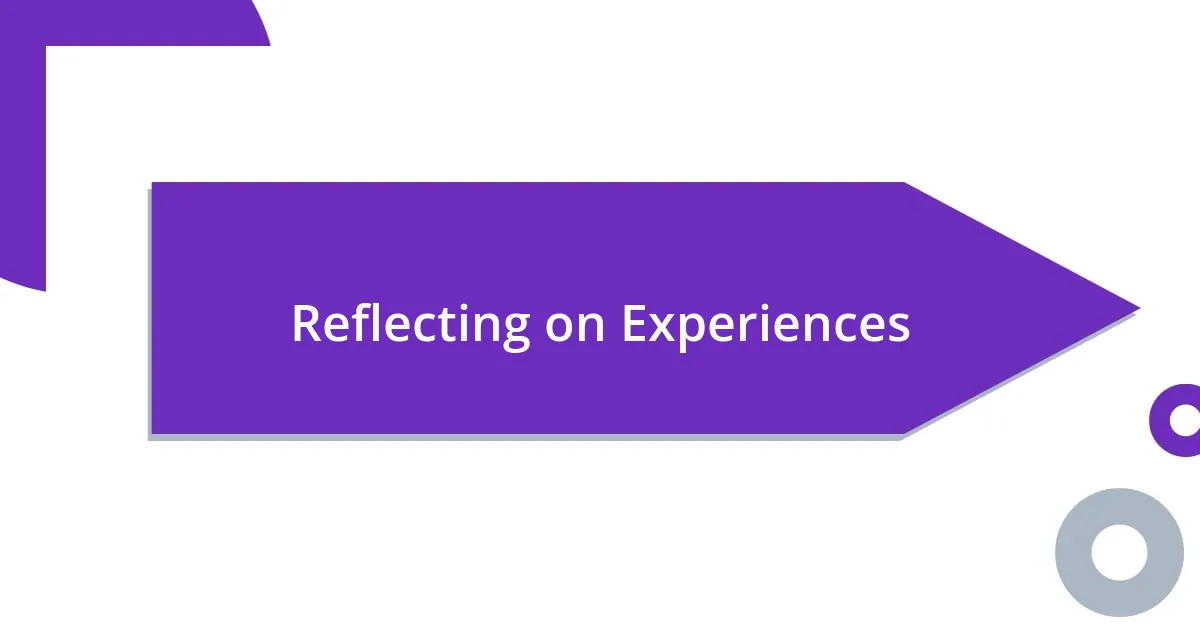
Reflecting on Experiences
Reflecting on my experiences has been an eye-opener in understanding my growth trajectory. I can recall a moment during a workshop when I was critiqued for a presentation. Initially, it stung—my immediate reaction was defensiveness. But upon reflection, I recognized that the feedback was a treasure trove of insights. Every piece of criticism pushed me to refine not just my skills, but also my approach to learning. Isn’t it fascinating how uncomfortable moments can lead to our strongest breakthroughs?
One exercise that stood out was the self-review after a series of workshops. I sat down with my notes and found patterns in my strengths and weaknesses. It struck me how much clearer I was on my path after this deep dive. I noted a recurring theme: my hesitancy to step out of my comfort zone. This revelation was pivotal, sparking a desire to tackle projects that terrified me. Have you ever experienced that moment when a simple reflection changed the way you see your potential?
As time passed, I began to appreciate the role of journaling in processing my workshop experiences. Each entry became a snapshot of my thoughts and feelings, capturing my fears, triumphs, and failures. Just the other day, I read back over my journey from a novice to someone who now confidently leads discussions. It’s empowering to witness the evolution; it makes every struggle worth it. Don’t you think documenting our experiences helps us appreciate our growth even more?
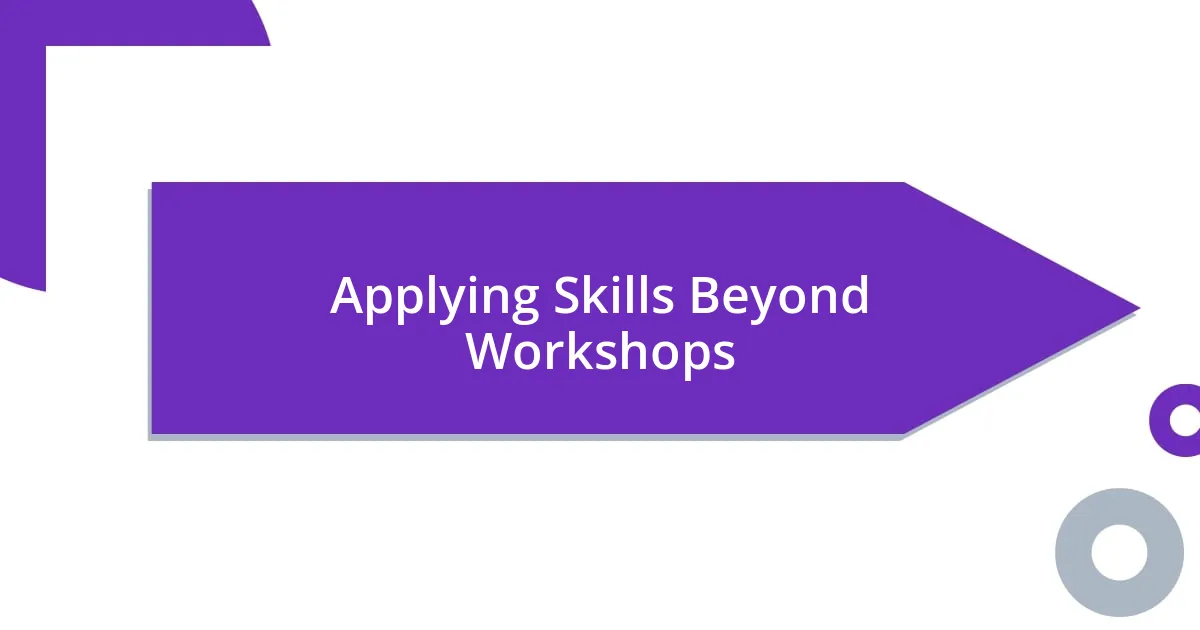
Applying Skills Beyond Workshops
I found that the real challenge—and joy—of applying skills from workshops came when I stepped outside the structured environment. One day, I took the initiative to lead a small team project at work. I drew on the collaboration techniques I learned in a workshop, and honestly, I felt a mix of excitement and apprehension. The progress was remarkable; not only did our efficiency increase, but the team’s morale also soared. It taught me that skills learned in a workshop can profoundly impact real-world situations, fostering a collaborative culture that I had never anticipated. Have you ever considered how classroom concepts translate into workplace dynamics?
In a surprising turn, I experimented with integrating elements from a public speaking workshop into my weekly team meetings. Initially, I felt unsure about whether my colleagues would embrace the new approach. To my delight, not only did they respond positively, but it ignited a lively exchange of ideas that we had been missing. I realized that applying those skills empowered me to cultivate an environment where everyone felt comfortable sharing their thoughts. Isn’t it amazing how stepping into a leadership role can elevate not just you, but the entire team’s potential?
I also ventured into the realm of volunteer work, applying my newly acquired skills in community projects. Leading a fundraising event, I employed the project management strategies I picked up from a workshop. It was exhilarating to see how effective planning could mobilize a group around a common goal. The sense of purpose and camaraderie we felt was phenomenal. Have you ever found that applying what you’ve learned in a workshop can instill a deeper connection to your community?
